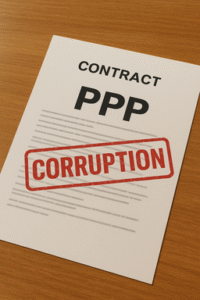By The National Patriots HeadlineNews.News Investigations Desk — 19 August 2025 (Lagos)
Executive Summary (Why this matters)
SICPA SA—the Swiss security-technology supplier seeking a Nigerian PPP—was convicted in Switzerland (2023) for corporate criminal liability tied to bribe payments abroad and ordered to pay CHF 81 million. Swiss prosecutors said the firm failed to take “necessary and reasonable” organisational precautions, making it possible for employees to bribe foreign officials.
Brazil (2021): Brazil’s anti-corruption authorities (CGU/AGU) disclosed a leniency agreement worth ~R$ 762 million involving SICPA-related matters, underscoring the seriousness of past allegations in that market.
 Nigeria’s default rule for PPPs is open, competitive bidding, with narrow, approval-based exceptions for direct negotiation. Any short-cut around the statutory pathway invites legal challenge and reputational harm.
Nigeria’s default rule for PPPs is open, competitive bidding, with narrow, approval-based exceptions for direct negotiation. Any short-cut around the statutory pathway invites legal challenge and reputational harm.
Nigeria’s corruption-perception score is low (CPI 2024: 26/100; rank 140/180). Skipping procurement safeguards would be read—domestically and internationally—as a governance setback.

Bottom line: Even if the SICPA proposal delivers revenue or anti-illicit trade gains, the deal must go back through the statutory, competitive PPP track (ICRC/BPP/FEC) to protect value-for-money, legality, and Nigeria’s international standing.
The Legal Bedrock Nigeria Must Not Ignore
1) Public Procurement Act (PPA) 2007
Nigeria’s framework requires open competitive bidding as the norm and sets out strict advertising, transparency, and evaluation duties for procuring authorities.
2) ICRC Act & PPP Regulations/Guidelines
Solicited PPPs: ministries must obtain ICRC Outline Business Case (OBC) clearance; pre-qualify; issue RFP; evaluate; then submit the Full Business Case (FBC) to ICRC; only after an ICRC FBC Certificate is the project sent to FEC for approval.
Procurement form: “Competitive Bidding… shall be the default form of procurement proceeding for PPP projects.” (ICRC PPP Regulations). Non-competitive routes require ICRC approval and, in security/emergency cases, Presidential approval—with benchmarking safeguards.
Reality check: Any approval that bypassed these steps would clash with Nigeria’s own rules and be vulnerable in court.

SICPA’s Recent Integrity History (Why extra caution is warranted)
Switzerland (2023):
Swiss federal prosecutors concluded SICPA bore corporate criminal liability for organisational failures that enabled bribery abroad.
Swiss prosecutors: SICPA was “criminally liable” for failing to take necessary organisational precautions that “made it possible for employees … to bribe foreign officials.”
Brazil (2021):
CGU/AGU announced a R$ 762 million leniency pact with SICPA/CEPTIS entities—funds to the Union and Brazil’s mint—reflecting the seriousness of corruption findings in that ecosystem.
Brazil’s then-CGU minister explained why firm-level accountability tools matter:
“Com [o acordo de leniência] conseguimos não apenas sancionar as empresas envolvidas com corrupção, mas também recuperar recursos que até então estavam perdidos.” (“With leniency agreements we can not only sanction companies involved in corruption but also recover funds previously lost.”)
Kenya (context, 2013–2025):
Kenya’s stamp/tax-trace system—long linked to SICPA—faced cost and procurement controversies; Kenya’s Court of Appeal later upheld KRA’s tender, illustrating that robust court-proof processes protect governments and projects.

Pakistan (2021–2022):
Track-and-trace procurement drew litigation from SICPA; courts dealt with jurisdiction and process; government proceeded with implementation—again showing transparent tenders withstand disputes.
Key inference: Across jurisdictions, process quality (competition, disclosure, documentation) determined whether governments kept programs on track when controversies hit.
Why Open Competition Is Non-Negotiable
International standards are blunt about procurement risk:
- OECD: “Public procurement is the government activity most vulnerable to waste, mismanagement and corruption.”
- OECD Foreign Bribery Report: “The majority of bribes are paid to obtain public procurement contracts… with bribes averaging 10.9% of the transaction value.”
When competitive steps are skipped, price opacity spikes, legal defenses weaken, and reputational contagion spreads fast—especially for countries already battling perception challenges (Nigeria CPI 26/100; rank 140).

Risks to Nigeria If Procurement Steps Are Skipped
Legal & Contractual Risk: Non-adherence to PPA/ICRC rules opens the door to injunctions, rescission, or damages, jeopardising implementation timelines and costs.
Fiscal Risk: Without competition and benchmarking, Nigeria risks overpaying for technology/services over multi-year PPP tenors. (OECD evidence on bribe premiums underscores potential value-erosion.)

Reputational Risk: Approving a PPP with a firm recently convicted for corporate criminal liability—without visible competitive due process—would be read globally as lowering standards, harming Nigeria’s CPI trajectory and investor confidence.
Operational Risk: Complex track-and-trace/fiscal-marking systems need supplier performance incentives and auditability best achieved through contestable, well-scoped RFPs.
What Authorities Should Do Now (Practical, lawful steps)
1. Immediate pause & publish the file: Disclose the project status—OBC/FBC, ICRC opinions, any BPP “No-Objection,” and basis for any direct-negotiation path claimed under Reg. 20/21 (if applicable).
Re-route to competition: If not already done, issue an EOI and RFP with clear technical, financial, and integrity criteria; mandate value-for-money benchmarking and lifecycle costing (ICRC/BPP frameworks already require this).

Integrity guard-rails: Require bidders to disclose beneficial ownership, third-party intermediaries, prior debarments/convictions, and adopt independent integrity monitoring with audit rights. (OECD guidance supports enhanced controls in high-risk procurement.)
Competition enablers: Allow multiple technical approaches (modular specs), insist on open data interfaces, escrow of critical IP, and performance-based payment with claw-backs for under-delivery.
Price discipline: Publish comparable stamp/trace unit-cost benchmarks and run a should-cost analysis; if a direct negotiation is ever justified, ICRC-approved benchmarking is compulsory before award.
FEC only after FBC Certificate: Ensure ICRC FBC Certificate precedes any FEC decision; no ministerial execution without all conditions precedent met.
Communicate internationally: Publicly reaffirm Nigeria’s adherence to OECD-type integrity principles to avoid perception damage while this PPP is re-tendered.

Balanced Comparative Notes
Kenya: Despite intense criticism over costs, the Court of Appeal ultimately upheld the underlying tender process—showing sound procurement documentation is a government’s best shield.
Pakistan: Even amid litigation by unsuccessful bidders (including SICPA), transparent process allowed rollout to proceed—lessons Nigeria can adopt.
Brazil: Authorities paired enforcement (leniency, penalties) with continuity measures in strategic sectors; institutional integrity tools coexist with procurement discipline.
Short Quote Box (for policymakers)
Swiss OAG on SICPA (2023): “Criminally liable for failing to take… precautions that made it possible for employees to bribe foreign officials.”
OECD on procurement risk: “Public procurement is the government activity most vulnerable to waste, mismanagement and corruption.”
OECD Foreign Bribery Report: “Majority of bribes are paid to obtain public procurement contracts… bribes average 10.9% of transaction value.”
Brazil’s CGU Minister (2021): “Leniency agreements sanction companies and recover resources previously lost.”
Conclusion
Nigeria has every tool it needs to procure critical anti-illicit-trade technology without controversy—laws, institutions, and a tested PPP playbook. Given SICPA’s recent conviction and multi-country scrutiny, Nigeria should not shortcut due process. Re-open the competition under ICRC/BPP rules, demand higher integrity guarantees, and only then take a proposal to FEC.
That path is slower than a fast-tracked approval—but it’s the only path that protects value for money, legality, and Nigeria’s global reputation. Anything less is a self-inflicted wound.
Methodological note
This report relies on official government and reputable international sources for all high-stakes claims and quotes, including: Swiss OAG/Swissinfo on SICPA’s conviction; Brazil CGU/AGU materials; Nigeria’s PPA/ICRC regulations; OECD policy pages/reports; and TI’s CPI 2024 country data. Where allegations about approvals in Nigeria are not publicly documented, we treat them as allegations and focus on the statutory route Nigeria must follow.
Dr. G. Fraser. MFR
The National Patriots.
Headlinenews.news Special Investigative Report.





